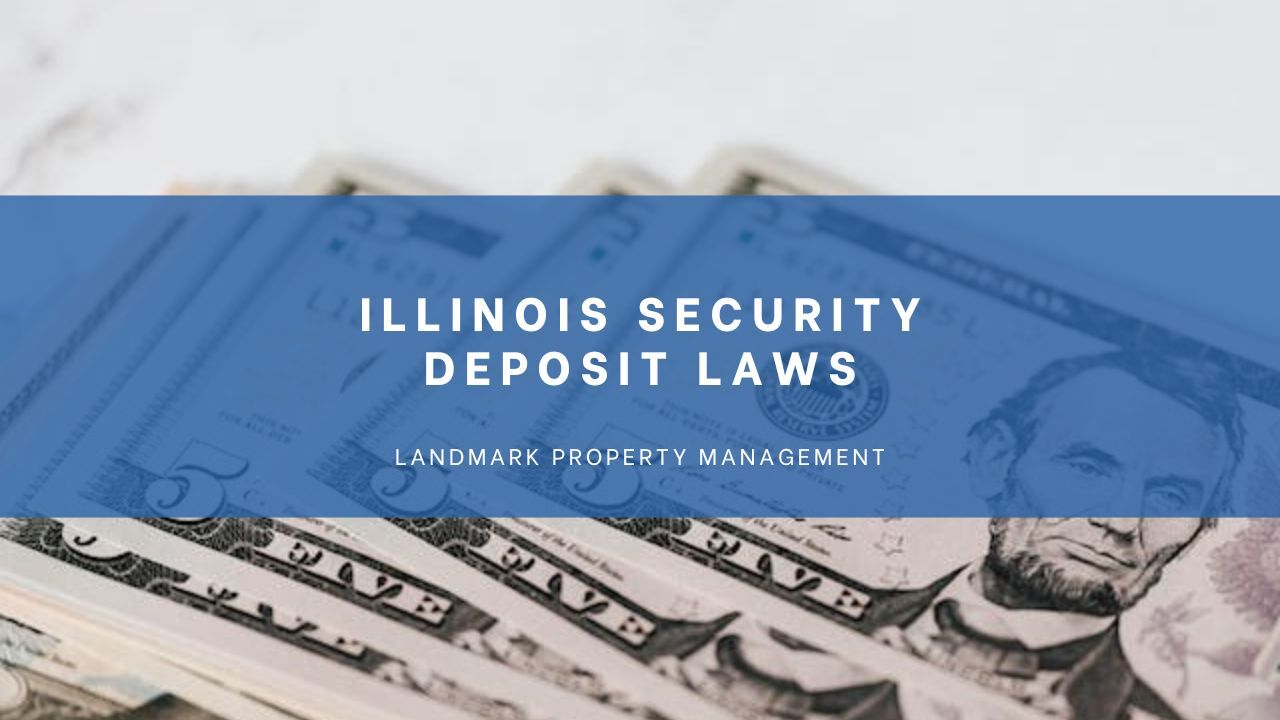Key Takeaways
Illinois state law sets general rules for security deposits, but local ordinances may impose stricter limits or requirements.
Security deposits can cover unpaid rent, unpaid utilities, professional cleaning, lost rental income, and damages beyond normal wear and tear.
Landlords must follow proper procedures for handling, holding, and returning deposits to avoid legal penalties.
As a landlord in Illinois, requiring a security deposit before a resident moves in is a critical step in protecting your property and your investment. Landmark Property Management helps property owners navigate these rules and manage their rentals efficiently.
Security deposits can cover unpaid rent, unpaid utilities, professional cleaning, lost rental income due to unit abandonment, and repairs for damages exceeding normal wear and tear.
However, it’s essential to follow all Illinois security deposit regulations. Failing to comply can result in serious consequences, including fines, civil liabilities, and even legal action. Understanding how much you can charge, how to handle and store deposits, and the timeframe for returning them is vital.
Here is a comprehensive guide to Illinois security deposit laws provided by Landmark Property Management.
BOOK A PROPERTY MANAGEMENT CONSULTATION TODAY
Maximum Security Deposit Law
Illinois does not generally limit the amount a landlord can charge as a security deposit. This flexibility allows landlords to set an amount that aligns with their risk management strategy and the rental market.
The only exception is when renting a mobile home park, where the deposit cannot exceed one month’s rent under the Illinois landlord-tenant law.
.jpg)
Local ordinances may impose stricter limits. In Chicago, for example, landlords can charge no more than the equivalent of one month’s rent.
Other cities with their own security deposit rules include Cook County, Oak Park, Mount Prospect, Urbana, and Evanston. Being aware of these local regulations ensures you remain compliant and avoids potential disputes with tenants.
Additional Pet Deposits
Illinois landlords can request additional deposits from residents who own pets. This kind of pet policy helps cover potential damages caused by animals, such as scratches, stains, or odors.
Exceptions must be made for residents with service animals or emotional support animals. Federal law, under the Fair Housing Act, requires landlords to provide reasonable accommodations for individuals with disabilities, including allowing these animals even if the property has a no-pet policy.
Other reasonable accommodations you may need to provide include:
Assigning accessible parking spaces for residents with mobility impairments.
Adjusting rent payment schedules to align with income assistance or other benefits.
Allowing unit transfers to meet accessibility needs.
Permitting residents to live with personal care attendants.
By understanding these obligations, landlords can maintain compliance while fostering inclusive and fair housing practices.
Security Deposit Receipt
Illinois state law does not require landlords to provide a receipt for security deposits. However, some municipalities have specific requirements that must be followed.
.jpg)
In Chicago, for instance, a receipt must be issued when a security deposit is collected. The receipt should include:
The amount of the security deposit collected.
The landlord’s and resident’s full names.
The date of deposit payment.
A description of the rental unit.
The landlord’s signature.
Providing a receipt creates a clear record for both parties and can prevent disputes about the payment in the future. Even in areas without strict receipt laws, issuing one is a best practice.
TAKE ADVANTAGE OF A FREE RENTAL ANALYSIS
Security Deposit Holdings
State law does not impose strict rules on how landlords must hold security deposits. Deposits do not need to be kept in a separate account or earn interest, except for landlords who own 25 or more units.
However, local rules may differ. In Chicago, security deposits must be held in a separate, federally insured account, and the account must earn interest. Maintaining compliance with these requirements not only protects your tenants but also demonstrates professionalism and transparency in your management practices.
Sale of Rental Property
When selling a rental property in Illinois, landlords are responsible for transferring all existing security deposits to the new owner. The new owner must notify tenants of the change in ownership within 21 days, posting the notice at the main entrance of each unit.
This process ensures that tenants are informed and reassured that their deposits are secure. Properly handling this transfer avoids disputes and legal complications during property sales.
Security Deposit Deductions
Landlords can deduct certain expenses from a security deposit after a resident moves out.

Common deductions include:
Unpaid rent or late fees.
Unpaid utility bills that the landlord is responsible for.
Repairs for damage beyond normal wear and tear.
Costs associated with lease violations.
Any charges clearly outlined in the lease agreement.
It is crucial to document all deductions and provide an itemized statement to the tenant. This transparency protects landlords from potential legal disputes and demonstrates that deductions are legitimate and in accordance with the law.
Local regulations may impose additional rules on permissible deductions, so landlords should verify their obligations in their city or county.
Security Deposit Returns
In Illinois, landlords must return security deposits within 45 days if there are no deductions. If deductions are to be made, landlords must provide the remaining deposit within 30 days after the resident moves out.
Providing the deposit on time and following the proper procedure is essential for maintaining compliance and fostering positive landlord-tenant relationships. Clear communication about deductions and timelines can prevent misunderstandings and potential legal action.
CONTACT US TODAY FOR MORE INFORMATION
Bottom Line
Compliance with Illinois security deposit laws is essential for protecting your rental property and avoiding legal issues. Landmark Property Management provides expert guidance and management solutions to ensure Chicago landlords meet these requirements while maximizing their investment.
From collecting deposits to handling deductions and returns, we can tailor our services to your property’s specific needs. Contact Landmark Property Management today to learn how we can help you manage your rental properties effectively.






.png)


